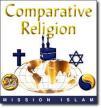In studying the different religions of the world and the histories of these belief systems, I see an underlying commonality in the universal need of mankind to make sense of the world; rather than coming away with a sense of differentiation, I see a unity in their evolution. If we reverse the histories of today’s major religions, we can see common ancestry in all basic beliefs. For example, the existence of multiple flood stories- the similarities of which cannot be dismissed- and the assimilation of pagan deities, oral traditions and rituals into the modern ecclesiastic dynamics of Christian-based religions argues to the fact that ancient religions have not died, but have been absorbed and transformed. I feel that, in taking this course, I’ve come away with a better sense of the brotherhood of mankind. One cannot study this course and remain disconnected from the whole.
I particularly liked the extent of comparison and the inclusion of related books that have been left out of the present Bible. I found it fascinating that the early church fathers felt compelled to omit any writings that favored an elevated role of women in the church, the dismissal of Gnostic beliefs, and the degree to which politics have influenced dogma. The fluidity and adaptability of religious belief is paramount in it’s remaining viable in a changing world. Societal justification of gender and race discrimination through the manipulative use of religious rhetoric incites rifts in the community and dissonance in the world. "Concerns over religious cohesiveness and identity vary with social and political circumstances." (Lesson 20- Assimilation) It’s a matter of control for the status quo. Let’s not forget that organized religion today is big business... and big money. Historically, the many schisms that formed the major religions that exist today have been influenced by money and power. This is not to say that the religions themselves have been corrupted as such, but that the leaders are not immune to these influences. This course returns one to the foundation of personal belief through knowledge, and knowledge is power. By learning more about our belief structures, we empower ourselves to better serve our G_d (and/or G_dess). By understanding and respecting the beliefs of others, we bring the family of man closer together- which is truly doing G_d’s work.
As I found this course so personally satisfying, it would be difficult to say what I liked the least. I think that I would have liked more content on Nature-based ancient religions and Wicca. And possibly, a more in-depth correlation between ancient Judaism and the beliefs of the indigenous people of that region (E.G. The gems in the breastplates of the Temple Priests and their significance). More than anything else, I feel that this course inspires the student to search for more information, and the links provided are invaluable.
I eagerly look forward to taking more courses from Rev. Kythera Ann.
Rev. Diane Young Chrisitian
*******************************
The Universal Life Church is a comprehensive online seminary where we have classes in Christianity, Wicca, Paganism, two courses in Metaphysics and much more.
Ordination with the Universal Life Church, is free, and lasts for life, so use the Free Online Ordination, button.
The ULC, run by Rev. Long, has created a chaplaincy program to help train our ministers. We also have a huge catalog of Universal Life Church materials. I've been ordained with the Universal Life Church for many years and it's Seminary since the beginning and have loved watching the continual growth of the seminary.
Try our new free toolbar at: ULC Toolbar







No comments:
Post a Comment